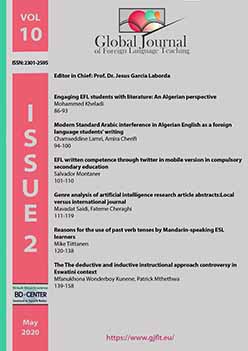The deductive and inductive instructional approach controversy in Eswatini context
The deductive and inductive instructional approach controversy in Eswatini context
Author(s): Mfanukhona Wonderboy Kunene, Patrick MthethwaSubject(s): Education, Foreign languages learning
Published by: Birlesik Dunya Yenilik Arastirma ve Yayincilik Merkezi
Keywords: ESL context; deductive approach; grammar; inductive approach; tenses;
Summary/Abstract: This study compared deductive and inductive approaches of teaching tenses to secondary school learners. The aim of this study was to test the efficiency of the two instructional approaches of teaching tenses by observing learners’ performance.Sixty participants (37 female and 23 male), learning English in the Kingdom of Eswatini, participated in this quasi experimental study. Convenience sampling was used to select participants who were randomly assigned to two control groups. The independent variable was ‘teaching method,’ with two levels: deductive versus inductive. The dependent variables were participants’ achievement scores derived from the pre-test and post-test. The independent t-test and the dependent t-test were used to analyse data. The results revealed that there was no significant difference between the deductive and inductive approaches in teaching tenses, although each method was effective in isolation. Based on the findings, this study recommends an integration of the two approaches in the teaching of tenses.
Journal: Global Journal of Foreign Language Teaching
- Issue Year: 10/2020
- Issue No: 2
- Page Range: 139-158
- Page Count: 20
- Language: English

